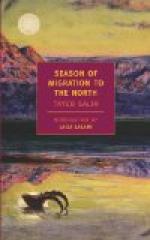[Illustration: Birch-barks at Fond du Lac]
Starting from Fond du Lac in July, a Chipewyan family sets out in two canoes, the big communal one, and the little hunting-canoe, the dogs following along shore. It is paddle and portage for days and weary weeks, inland and ever inland. In October the frost crisps into silence the running water and the lake lip. Snow begins to fall, and the grind of forming ice warns the Chipewyan it is time to change birchbark for moccasin and snow-shoe. Canoes are cached, and the trail strikes into the banksian pine and birchwood. The door of the forest is lonely and eerie. It no longer seems incongruous that, although Big Partridge wears a scapular on his burnt-umber breast and carries with him on his journey the blessing of Father Beihler, he also murmurs the hunting incantation of the Chipewyans and hangs the finest furs of his traps flapping in the top of the jack-pine, a sop to the Cerberus of Mitchie Manitou, the feared Spirit of the Wood.
Winter sees Indian families, each little group a vignette in the heart of the wider panorama, flitting over lake surfaces to ancestral fur-preserves. In the early snow they pitch tepee, family fires are lighted, and from this centre the trapper radiates. The man sets his traps, and if the couple is childless his wife makes an independent line of snares. Each individual traps for miles and days alone, and an accident in the woods means a death as lonely and agonising as that of the animal he snares. With blanket, bait, and bacon on a small hand-sled, silently the trapper trudges forward. The Northern Lights come down o’ nights, and it is cold; but cold makes finer fur. Down far trails in gloomy forests, across the breasts of silent streams, the Chipewyan trudges from trap to trap; if he finds fifty dollars worth of fur along the whole line he is content. It is not this lonely man who gets the high price, madame, for your marten stole or opera-cloak of ermine.
On the trail the hunter may go hungry for two days and no word of complaint, just a tightening of the lips and L’Assumption belt, and a firm set to the jaw; but when a moose is killed life is one long supper. A jolly priest whispers of this confession from a son of the Church, a recent brand from the burning, “O Father, I know that Christianity is true, the great, the strong religion. When I was a heathen Chipewyan and trapped with my mother’s tribe I ate ten rabbits a day. But now I am a Christian, a good Catholic, seven rabbits are enough for me—I will eat no more!”
In the early days the H.B. Company allowed its men en voyage five pounds of meat a day, and each kiddie three pounds. In British Columbia and the Yukon the ration was one salmon; up here on the Athabasca one wild goose or three big whitefish; on the Arctic foreshore two fish and three pounds of reindeer meat. This was the scheduled fare, but the grimness of the joke appears in the fact that each man had to run his breakfast to earth before he ate it.




